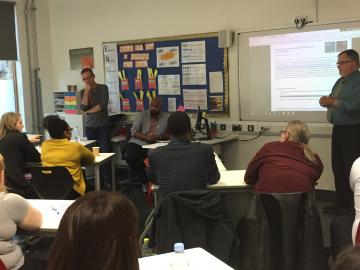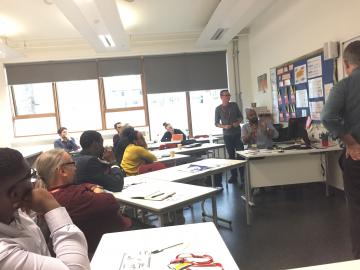Resources for Schools Project

How do we create a curriculum in schools and universities that best reflects the histories of our current students and future citizens? As Britain has become a more diverse society, and as a result become increasingly aware of its diverse past, the need to ensure that is reflected in what we teach and research is a question of growing importance, educationally and politically. In Oxford, we have launched a new undergraduate curriculum better designed to ensure global history is more prominent in the experience of all our students, though delivering teaching that adequately reflects the history of all parts of the world remains a work in progress.
In schools, many complain that a curriculum that often focuses on key events such as the War of the Roses or the Second World War fails to reflect Britain’s deep history of migration and imperialism, in which what it meant to be ‘British’ changed radically over time. New undergraduates taking my African history courses, meanwhile, often arrive with little or no experience of studying the continent, either its great empires and kingdoms, or its distinct history of global connectedness.
In late 2016, having read yet another op-ed bemoaning the inadequacies of school teaching in these regards, I chanced on a new GCSE course entitled ‘Migration, Empire and the Peoples’, a British history option that emphasised the long history (starting in 970 AD) of British inter-connectedness with the wider world: the textbook’s front cover shows Kwame Nkrumah, the first leader of independent Ghana, meeting the then decolonising British military leadership. This was, I thought, exactly the kind of history course I wanted my future students to be taking. Enthused, I recommended the course to my partner, who is head of history in what is euphemistically described as a ‘challenging’ state school: more than half of its students speak English as a second language and nearly half receive free school meals. Surely, I thought, this was an ideal course for such a school. She immediately punctured my naïve enthusiasm: the problem, she rightly identified, was that teachers delivering such a new and innovative course wouldn’t have access to appropriate resources. Such resources are the lifeblood of school history lessons: for existing courses, online banks of resources are available for teachers to deploy in classrooms – as one example, the Wellcome Trust provides fantastic materials supporting the teaching of the history of science and medicine.

If resources were going to be a fundamental problem, why not get Oxford historians to write those resources? Our research expertise could be put at the service of the new GCSE option and, indeed, other school history courses. I contacted the authors of the course textbook, Robin Whitburn and Abdul Mohamud of University College London, and we met up in January 2017. They were delighted at the suggestion and, having discussed the proposal informally with the head of the History Faculty and the Faculty’s Race Equality Working Group, we got the go-ahead. The Faculty sees the project as an opportunity to share its research outside traditional academic circles, particularly in state schools that have historically sent very few or no students to Oxford: it also indicates Oxford’s own increasing engagement with non-western and global history, and their centrality to British history and to the interests and experiences of our increasingly diverse undergraduate student intake.
In May this year a workshop held at the Faculty brought together interested Oxford researchers – professors, college tutors, post-doctoral and doctoral researchers – with Whitburn and Mohamud and a set of schoolteachers who are delivering the new option for the first time in the 2017/18 academic year. This was an inspiring event, in which teachers were able to explain to academics how they deliver complex historical concepts, methods and debates to 15 and 16 year olds, and together develop their shared understanding of how innovative resources could bring to life key questions of Britain’s changing global role and national identity and the role of migration and imperialism in shaping these histories.
Over the summer a first set of resources was developed and uploaded to our ‘resources for schools’ webpage: http://www.history.ox.ac.uk/resources-schools. Most of these focus on a key individual or event as a way of illustrating a much broader set of issues: they have been designed to be delivered in a classroom setting, so use visual imagery and clear language to communicate their arguments. Although the resources were designed with a specific option course in mind, they are publicly available to all teachers for any course they deem relevant and the project has the potential to be rolled out to other under-resourced option courses in the future.
A launch event for the project was held at one of the schools running the new course, St. Michael’s College, Bermondsey in south London in September 2017: I had the positive if slightly nerve-wracking experience of presenting some of the new resources to the teachers present. There was great appreciation of what we have achieved so far, and there is clearly demand for many more resources of this type.
We currently expect to have about 15 resources on the site by the end of 2017 with hopefully more to come in the new year. We would like to invite alumni themselves to get involved: if you think you would like to develop a resources for this course, please get in touch with myself or my colleague Jeannie Scott, and we will let you know what is involved.
There is clearly much more to be done to develop resources for this course, and of course to provide a curriculum that reflects the diverse experiences of Britain, its school students and Oxford’s present and future students. We hope this project provides a modest step in the right direction.
Miles Larmer
Professor of African History



